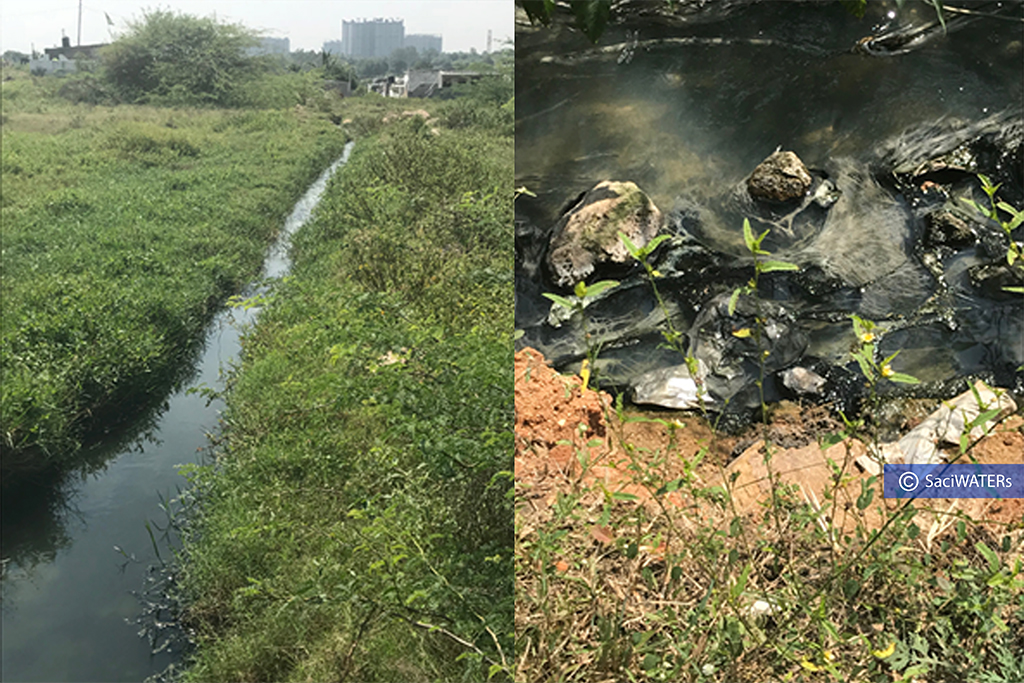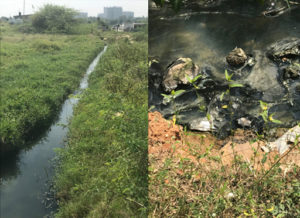
Safe water, a rarity and a commodity: Story of Farah Nagar
Farah Nagar is a cluster in the Malkaram village in peri-urban Hyderabad that presents an extreme case of lack of access to safe water and poor living conditions. This cluster is a part of Jawaharnagar Gram Panchayat and is home to a huge landfill site of the Hyderabad Municipal Corporation and a well-known educational institution, i.e. Birla Institute of Technology and Science (BITS). Although Malkaram shows characteristics of an area in transition from rural to urban, it is still governed by a Gram Panchayat. The cluster has 125 households belonging to the Muslim community all of who are very poor. Majority of the population work as labourers or drivers in the landfill site or BITS and few work as electricians and plumbers. Farah Nagar is the poorest cluster compared to the others in Malkaram and is devoid of even the basic infrastructure such as roads, lighting and sewer lines.
The only source of water in Farah Nagar is ground water that is accessed through a single bore well located within the Mosque premises. The ground water in the cluster is heavily contaminated due to wastewater discharge from BITS and the leachate flow from landfill. Due to the absence of state water supply, which is the case in almost all peri-urban villages, the residents continue to use this polluted ground water to meet all the domestic needs while drinking water needs are met from alternate water sources such as Reverse Osmosis (RO) filter plants that supply treated water.

Waste water from BITS passing through Farah Nagar
Due to the absence of any alternative water source, the people in Farah Nagar face extreme water scarcities during summers when the borewell runs dry. Residents have reported of increased borewell failure during summer seasons. While in other peri-urban study areas purchasing tanker water is a common phenomenon during summers, in Farah Nagar only few households purchase water as it is not affordable for the majority. These water scarcities become more intense during summers of drought years. In such conditions, the residents look for alternate sources depending on their financial status.
Main source of drinking water for most of the year is treated water from RO plants. These plants are mostly run by private entities, also in Farah Nagar, and water during normal seasons is priced in the range of USD 0.06 to USD 0.13 for 20 litres. During lean seasons when the demand for water is high the price of the treated water almost doubles. Our field insights reveal that a number of households in Farah Nagar who would otherwise buy treated water for drinking during normal seasons switch to consuming the polluted groundwater during lean seasons in the absence of affordable choices. Field observations have revealed that in times of extreme water scarcity, households have to prioritize their use of purchased water. Utmost priority is given for drinking followed by usage in cooking rice and preparing tea. People during summers are forced to depend on consuming this polluted water and pollution is seen as an additional factor that further restricts their access to safe water specially during the lean season.
While Farah Nagar is reeling under extreme water insecurities, the conditions in neighboring clusters is far better as they have managed to successfully negotiate with the agency responsible for water distress to supply treated water. It appears that presence of basic agency is a pre-requisite to gain access to water under such conditions. The case of Farah Nagar is a clear demonstration of the water distress that the most marginalized communities in peri-urban areas are subject to due to haphazard and rapid expansion of economic activities in peri-urban areas without being complemented with adequate infrastructure or devolution of adequate administrative and financial power to the local governing bodies. This case brings home the need to have a different administrative power to peri-urban spaces, in line with the provision of the ‘nagar panchayats’ in the 74th amendment of the constitution of India. This case also highlights the inadequacies of the state water policy that could deal with the water insecurities of the poor and the marginalized in a water scarce condition that is heightened due to the urban waste and pollution problems in the peri-urban settings.
By Monica Priya
LEAVE A COMMENT